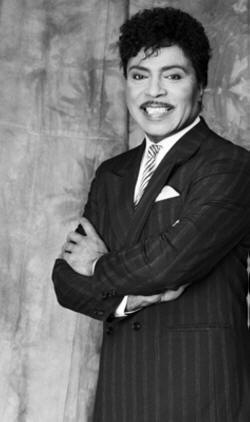

Queer Places:
Oakwood Memorial Gardens Cemetery
Huntsville, Madison County, Alabama, USA
 Little Richard (December 5, 1932 - May 9, 2020) merged the fire of gospel with New Orleans rhythm and
blues by pounding the piano and wailing with gleeful abandon. The over-the-top electricity of Little
Richard's performances were also compounded by his outrageous, gender-bending appearance, replete with
a six-inch stack of hair, eyeliner, pancake makeup, and flashy, attention-grabbing clothes.
In 1958, however, at the height of his career, Little Richard renounced his rock and roll lifestyle in favor of
fundamentalist religion. Since that time, he continued to vacillate between show business and the
church, while never losing sight of his profound influences on countless rock and roll performers. Despite
his inner conflict, Little Richard has justifiably earned his status as a true musical legend.
Little Richard (December 5, 1932 - May 9, 2020) merged the fire of gospel with New Orleans rhythm and
blues by pounding the piano and wailing with gleeful abandon. The over-the-top electricity of Little
Richard's performances were also compounded by his outrageous, gender-bending appearance, replete with
a six-inch stack of hair, eyeliner, pancake makeup, and flashy, attention-grabbing clothes.
In 1958, however, at the height of his career, Little Richard renounced his rock and roll lifestyle in favor of
fundamentalist religion. Since that time, he continued to vacillate between show business and the
church, while never losing sight of his profound influences on countless rock and roll performers. Despite
his inner conflict, Little Richard has justifiably earned his status as a true musical legend.
Little Richard was born Richard Wayne Penniman on December 5, 1932 in Macon, Georgia, the third oldest of seven boys and five girls. According to Tony Scherman, although Richard's father Bud sold bootleg liquor, Bud and his wife Leva Mae were high-minded, proper people who were heedful of their children's welfare and hopeful for their future. The Pennimans also had a family gospel group and Richard grew up steeped in the gospel tradition. At age fourteen he adopted the stage name Little Richard and ran off to join one of the many itinerant medicine shows (traveling salesmen who plied customers with dubious cure-alls) that performed in small towns around the South. Richard soon began performing at low-rent rhythm and blues revues, where he learned to mix gospel fervor with blues lyrics. In 1951 Richard befriended flamboyant, openly gay R&B singer Esquerita, who taught him the pounding piano style for which he would become famous. By 1955, after seeing his popularity increase dramatically, Little Richard made his way to New Orleans to record a demo tape that he sent to Art Rupe, president of Specialty Records, a small but successful Los Angeles-based rhythm and blues and gospel label. The tape ended up on the desk of Rupe's assistant, Bumps Blackwell, who immediately recognized the voice as star material. Blackwell met Little Richard in New Orleans and, in a break from an otherwise frustrating studio session, watched as Little Richard began fooling around on the studio piano. The result was both electrifying and revolutionary. Little Richard tore into a slightly obscene ditty he had previously penned, and "Tutti Frutti" was born. By January 1956 "Tutti Frutti" was number seventeen on Billboard's pop chart and number two on the R&B chart. It sold over half a million copies. Perhaps more important, it succeeded in bringing the races together, selling to both black and white youth. Richard observed to biographer Charles White, "The white kids had to hide my records cos they daren't let their parents know they had them in the house. We decided that my image should be crazy and way-out so that the adults would think I was harmless." Richard quickly followed his initial success with a string of eight Top 40 singles including "Long Tall Sally," "Rip It Up," "Good Golly Miss Molly," and "Lucille," a raucous paean to a female impersonator. In 1958, however, Little Richard's inner conflict between his sternly religious upbringing and his homosexuality boiled to the surface. According to Scherman, if Richard was more of a musical rebel, it may indeed have been because of his homosexuality, which he agonized over. Even in his wildest days he carried a Bible, and read and quoted from it regularly. On tour in Australia in the autumn of 1958, Little Richard hurled his diamond rings into Sydney Harbor, vowed to quit rock and roll and, on returning to the United States, enrolled in Oakwood Bible College in Huntsville, Alabama. Little Richard staged several comebacks over the years, but he never scored another Top 40 hit after 1958. He continued to see-saw between rock and roll and religion. He occasionally made appearances on television and in movies, known more as a colorful figure from the early days of rock and roll than taken seriously as a contemporary performer. Nevertheless, Little Richard's seminal influence in the arena of rock music cannot be diminished. He remains a legendary and iconic figure in popular music. He was given further proof of his continued popularity when, in July 2003, he was inducted into the Songwriters Hall of Fame.
My published books: